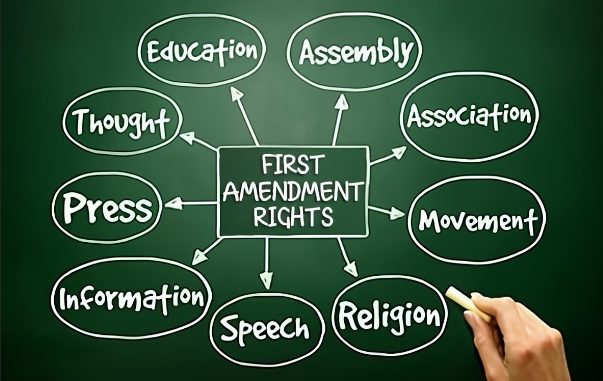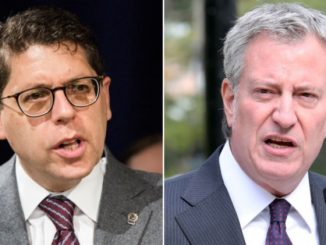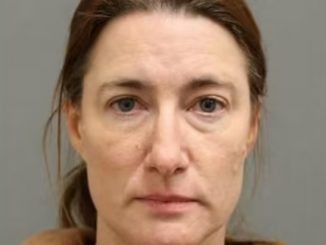
In the case decision posted below, the Ninth Circuit in California decided that two students must be disciplined for severe bullying and harassing comments made in off-campus social media posts:
“The court explained that some of the posts used violent imagery that, even if subjectively intended only as immature attempts at malign comedy, would reasonably be viewed as alarming, both to the students targeted in such violently-themed posts and to the school community more generally. Nothing in the First Amendment would even remotely require schools to tolerate such behavior or speech that occurred under its auspices.”
The Ninth Circuit affirmed the district court’s judgment rejecting First Amendment claims brought by students against Albany High School and school officials.
There are many cases available online which cite limitations to First Amendment free speech in school settings.
See Morse v. Frederick, 551 U.S. __, 127 S. Ct. 2618 (2007)
Editor, Parentadvocates.org
Editor, New York Court Corruption
Editor, National Public Voice
Editor, NYC Public Voice
Editor, Inside 3020-a Teacher Trials
US Court of Appeals for the Ninth Circuit Opinions |
|||
|
Court Description: First Amendment / Free Speech.
The panel affirmed the district court’s judgment rejecting First Amendment claims brought by students against Albany High School and school officials after the students were disciplined for assertedly “private” off- campus social media posts that amounted to severe bullying or harassment targeting particular classmates. The panel held that, under the circumstances of the case, the school properly disciplined two of the involved students for bullying.
Students Kevin Chen and Cedric Epple claimed that defendants violated their free speech rights under the First Amendment, the California Constitution, and the California Education Code. They argued that their speech was not susceptible to regulation because they engaged in it off campus, and therefore defendants could not constitutionally discipline them.
First, the panel discussed the framework that the Supreme Court has established for determining whether school districts can discipline students for on-campus speech. Under that framework, students do not have a First Amendment right to target specific classmates in an elementary or high school setting with vulgar or abusive language. As a result, there was no question that Epple and Chen could be disciplined for their speech had it occurred on campus. The posts in the social media account include vicious invective that was targeted at specific individuals and that employed deeply offensive and insulting words and images that, as used here, contribute nothing to the “marketplace of ideas.”
Moreover, some of the posts used violent imagery that, even if subjectively intended only as immature attempts at malign comedy, would reasonably be viewed as alarming, both to the students targeted in such violently-themed posts and to the school community more generally. Nothing in the First Amendment would even remotely require schools to tolerate such behavior or speech that occurred under its auspices.
Second, the panel considered whether Epple and Chen were insulated from discipline because their speech occurred off campus. The panel concluded, taking into account the Supreme Court’s recent decision in Mahoney Area Sch. Dist. v. B.L. ex rel. Levy, 141 S. Ct. 2038 (2021), that the speech bore a sufficient nexus to Albany High School and its students to be susceptible to regulation by the school. Specifically, the panel applied the sufficient- nexus test, outlined in McNeil v. Sherwood Sch. Dist. 88J, 918 F.3d 700, 707 (9th Cir. 2019), to the speech at issue here, keeping in mind the additional considerations identified in Mahoney. Under McNeil, Epple’s subjective intention to keep the account private was not controlling. The panel held that given the ease with which electronic communications may be copied or shown to other persons, it was plainly foreseeable that Epple’s posts would ultimately hit their targets, with resulting significant impacts to those individual students and to the school as a whole.
The remaining McNeil factors strongly supported the school’s assertion of disciplinary authority. Although Chen’s involvement in the account was substantially more limited than Epple’s, the panel concluded that he was nonetheless properly subject to discipline as well. Chen contributed to the account multiple times in ways that were directly related to Albany High School. As with Epple, Chen’s conduct had a sufficient nexus to Albany High School and, under Tinker v. Des Moines Independent Community School District, 393 U.S. 503 (1969), was properly subject to discipline. Accordingly, the panel rejected Epple’s and Chen’s claims that their First Amendment rights were violated by defendants’ disciplinary actions towards them. Finally, the panel concluded that the discipline did not independently violate the California Constitution or the California Education Code. Because California follows federal law for free expression claims arising in a school setting, Epple’s and Chen’s reliance on the California Constitution failed for the same reasons discussed above. The panel held that Epple’s and Chen’s reliance on California Education Code §§ 48950(a) and 48907 similarly failed, and it did not preclude defendants from disciplining Epple and Chen.
Epple claimed that he was deprived of his due process right to a fair hearing before an impartial tribunal because a member of the school board who voted to expel him was biased against him. The district court dismissed this claim on the ground that Epple had failed to exhaust judicial remedies. Even if Epple’s judicial remedies were exhausted, the panel affirmed the dismissal of Epple’s due process claim on the separate ground that a California state court’s decision rejecting Epple’s claims of bias had preclusive effect here. Judge Gould concurred. He wrote separately, in light of the continued disturbing prevalence of hate speech, to underscore that the First Amendment and Supreme Court precedent do not require courts to always strike down a government entity’s attempts to prevent harm to their citizens—especially in the context of hateful speech at schools harming children.




Be the first to comment